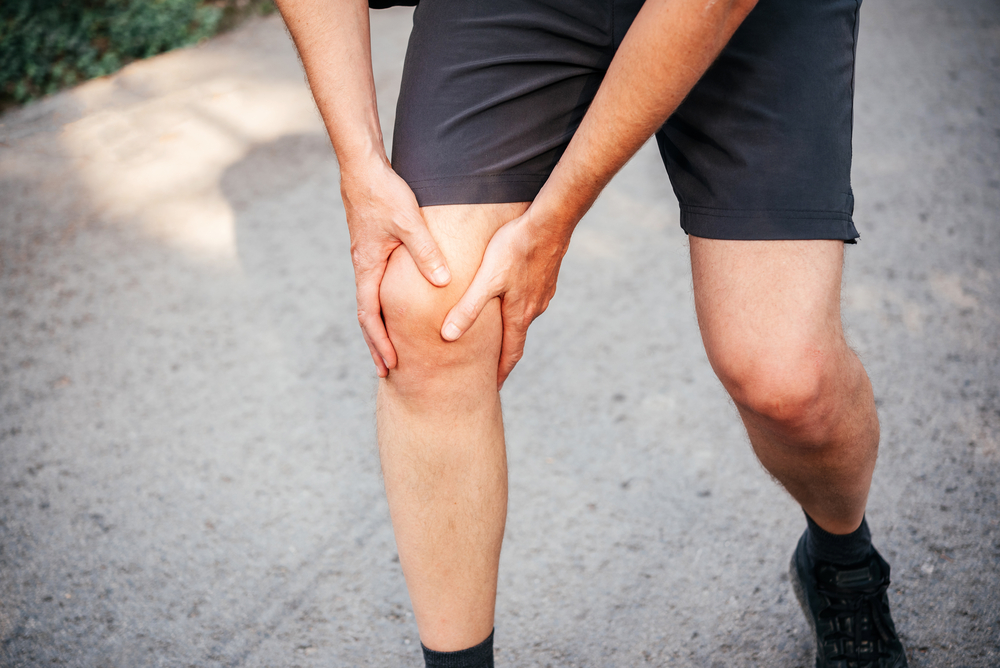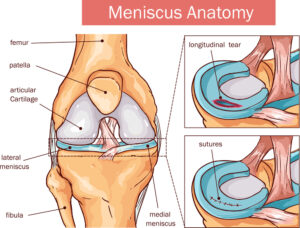
The knee joint is a sophisticated structure designed to facilitate easy movement and provide stability when it is under pressure. It consists of several bones - the femur and tibia (in the lower leg) - that meet at the joint and give it strength. The largest bone of the body, the femur (in the upper leg) also meets at the knee to make up the joint. Additionally, the kneecap, or patella, sits in front of this joint as an extra layer of protection. But perhaps most importantly, keeping the knee stable by helping to transfer weight evenly between bones are two wedge-shaped pieces of fibrocartilage called menisci. These cartilage discs form the pads inside of the knee joint.
Essentially acting as shock absorbers, these menisci are essential for allowing comfortable movement from the knee while still providing enough support to help cushion high-impact activity. Unfortunately, some instances can put the meniscus at a higher risk of tearing and becoming damaged.

One of the most common causes of injury to the meniscus is trauma, such as from a fall or car accident. The force of the impact can cause the meniscus to tear.
Another common cause of meniscal injury is overuse. This can occur when someone repeatedly performs the same motion over and over again, such as during a sporting activity. Over time, this can lead to the meniscus becoming worn down and eventually tearing.
As we age, the cartilage in our joints begins to break down. This process is called degeneration, and it can lead to pain and stiffness in the joints. It can also increase the risk of meniscal tears.
Being overweight or obese puts extra stress on our joints, which can lead to pain and inflammation. It also increases the risk of developing degenerative joint conditions such as osteoarthritis. Obesity is, therefore, a risk factor for meniscal tears.
If our muscles and tendons are not flexible enough, they can put too much strain on our joints when we move. This can lead to joint pain and inflammation and an increased risk of joint injuries such as meniscal tears.
Weak muscles around our joints can also lead to joint pain and instability. This can increase the risk of falling and sustaining a joint injury such as a meniscal tear.
Some people are born with abnormalities in their joints that make them more susceptible to injury. For example, people with shallow knee sockets (a condition called patella Alta) are at greater risk for developing patellar tendonitis, which can lead to knee pain and instability.
In rare cases, an infection can cause meniscal injury. This type of infection is usually the result of bacteria entering the knee joint through an open wound. Infections can cause the meniscus to become inflamed and can lead to pain, swelling, and stiffness.
Autoimmune disorders such as rheumatoid arthritis can also cause meniscal injury. These disorders cause the body's immune system to attack healthy tissue, which can lead to inflammation and damage to the cartilage.
The knee is a fascinating joint with many innate protections in the form of cartilage. The meniscus, in particular, is an amazing structure that helps to dissipate force and protect the bones of the knee from wear and tear. Understanding how it works can help us better take care of our knees and prevent injuries.
For non-surgical treatment of knee pain, reach out to Belden Village Chiropractic & Wellness Center. If your knee pain is evaluated and it is determined that non-surgical care may benefit you, it will be offered and your knee pain can be managed at our office. If it is determined that you may need additional testing or referral, we work with many of the local specialists.
References:
https://orthoinfo.aaos.org/
https://www.mayoclinic.org/